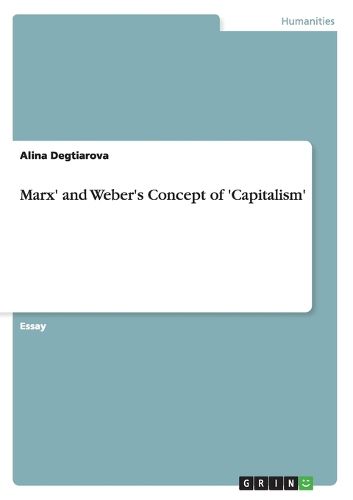Readings Newsletter
Become a Readings Member to make your shopping experience even easier.
Sign in or sign up for free!
You’re not far away from qualifying for FREE standard shipping within Australia
You’ve qualified for FREE standard shipping within Australia
The cart is loading…






Essay from the year 2012 in the subject Philosophy - Philosophy of the 19th Century, University of Bremen, language: English, abstract: Karl Marx and Max Weber are the classics of German sociology of the end of 19th and the beginning of 20th centuries. This paper provides a brief overview on Marx’ and Weber’s perception and definition of the notion of ‘capitalism’ as well as their further comparison. Capitalism in the theories of these two prominent sociologists is represented from the different points of view, thus, the comparison promises to be significant. As the main sources for this research it is planned to use main works of Karl Marx and Max Weber on capitalism, particularly: Capital: A Critique of Political Economy and The Protestant Ethic and the Spirit of Capitalism along with analytics and criticisms of their theories, which have been done by other sociologists.
$9.00 standard shipping within Australia
FREE standard shipping within Australia for orders over $100.00
Express & International shipping calculated at checkout
Essay from the year 2012 in the subject Philosophy - Philosophy of the 19th Century, University of Bremen, language: English, abstract: Karl Marx and Max Weber are the classics of German sociology of the end of 19th and the beginning of 20th centuries. This paper provides a brief overview on Marx’ and Weber’s perception and definition of the notion of ‘capitalism’ as well as their further comparison. Capitalism in the theories of these two prominent sociologists is represented from the different points of view, thus, the comparison promises to be significant. As the main sources for this research it is planned to use main works of Karl Marx and Max Weber on capitalism, particularly: Capital: A Critique of Political Economy and The Protestant Ethic and the Spirit of Capitalism along with analytics and criticisms of their theories, which have been done by other sociologists.